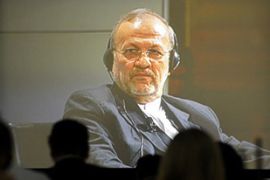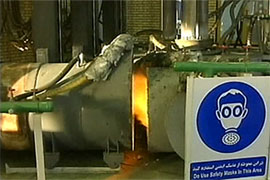US denies Iran nuclear deal ‘close’
Defense secretary dismisses Iran’s claims uranium swap could be agreed in near future.

“The reality is, the longer that this goes on and the longer they continue to enrich, the value of the Tehran research proposal as a reassurance to the international community diminishes,” he said.
He said Iran had done nothing to reassure the international community that they were prepared to comply with the NPT (Non-Proliferation Treaty) or stop their progress towards a nuclear weapon.
“Therefore I think various nations need to think about whether the time has come for a different tack,” Gates said, in an apparent reference to sanctions.
‘Good meeting’
His comments were in response to those of Manouchehr Mottaki, Iran’s foreign minister, who, speaking at the Munich security conference in Germany on Friday, said Iran saw good prospects for clinching such a deal.
“Under the present conditions that we have reached, I think that we are approaching a final agreement that can be accepted by all parties,” Mottaki said.
He said it should be up to Tehran to set the amounts to be exchanged, based on its needs.
On Saturday Mottaki met with Yukiya Amano, the head of the IAEA, in Munich.
“We had a very good meeting,” Mottaki said.
“We discussed and exchanged views on a wide range of issues, views about the proposal that is on the table.”
Amano said there were no fresh proposals from Tehran.
“We had a very interesting discussion … There was not a new proposal. We exchanged views,” he said.
‘Delay tactics’
Alan Fisher, Al Jazeera’s correspondent at the Munich conference, said most Western nations believed all Iran was doing was delaying the process which would mean the possibility of UN security council sanctions being raised against them.
| in depth | |||||||||||||||||||||||||||
|
“The Americans have said there is a deadline for Iran to comply if they don’t there will be consequences, ” Fisher said.
“What we’re hearing in Munich is the [Iranian] foreign minister backing the line of his president, but we have the German foreign minister saying he believes they are extending a hand of friendship to the Iranians but it is going into empty space at the moment.
“They feel the Iranians aren’t doing enough to justify what they say are legitimate fears the West has about its nuclear programme.”
Foad Izadi, a professor of politics at the University of Tehran told Al Jazeera that what is puzzling to some people in Tehran is why, when Iran is willing to accept the offer, are they are being criticised.
“Mr. Mottaki said Iran is willing to make a formal offer to the IAEA. [However] there are a number of details that need to be worked out [before that happens] – the timing, the location and the amount of the exchange,” Izadi said.
“Because of the history that Iran and the West have had, Iran is somewhat cautious.
“They want to propose an idea, see what the response from the other side is, and then sign papers.”
Sanctions push
The US and its allies have been pushing for a fourth round of UN sanctions to be slapped on Iran for not complying with UN resolutions over its nuclear programme, but Russia and China are likely to be opposed to any new penalties.
Asked about China’s opposition so far to additional sanctions, Gates said: “I think there will still be an effort to engage with China and I would say I personally don’t believe that the door is closed.”
Sergei Ivanov, Russia’s deputy prime minister, said on Saturday that if new sanctions are imposed, they “should be limited to non-proliferation only and not be expanded to cultural, humanitarian, or economic parts of Iranian activity.”
 |
| The US urged for sanctions to be put on Iran for not complying over its nuclear programme |
The uranium swap deal was first discussed last year between Iran and six world powers, which saw it as a way to ensure Tehran did not further enrich its uranium to a level that would be potentially usable in a nuclear bomb.
But Tehran, which insists its nuclear programme has only peaceful intentions, has failed to respond positively to the proposal from the group – the US, Russia, China, Britain, France and Germany – until this week.
Mahmoud Ahmadinejad, Iran’s president, said in a television interview on Tuesday that Tehran would have “no problem” sending abroad its stocks of low-enriched uranium to be further purified into fuel.
Iran needs nuclear fuel to power a UN-monitored research reactor in Tehran, but Western powers fear its uranium enrichment programme masks efforts to produce atomic weapons.
To curb such fears, the IAEA has proposed that Tehran ship uranium to Russia and France to be further purified into reactor fuel.
Tehran agreed in principle to the offer during talks with world powers in October, but later appeared to reject the deal and said it preferred a gradual swap for fuel, preferably on Iranian soil.
